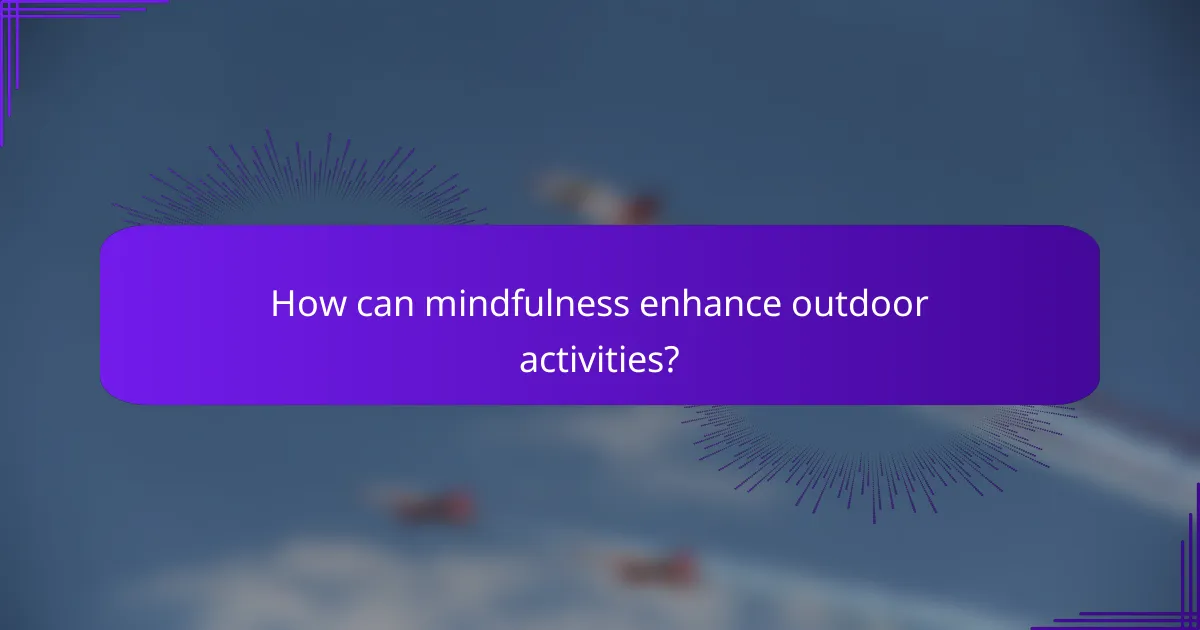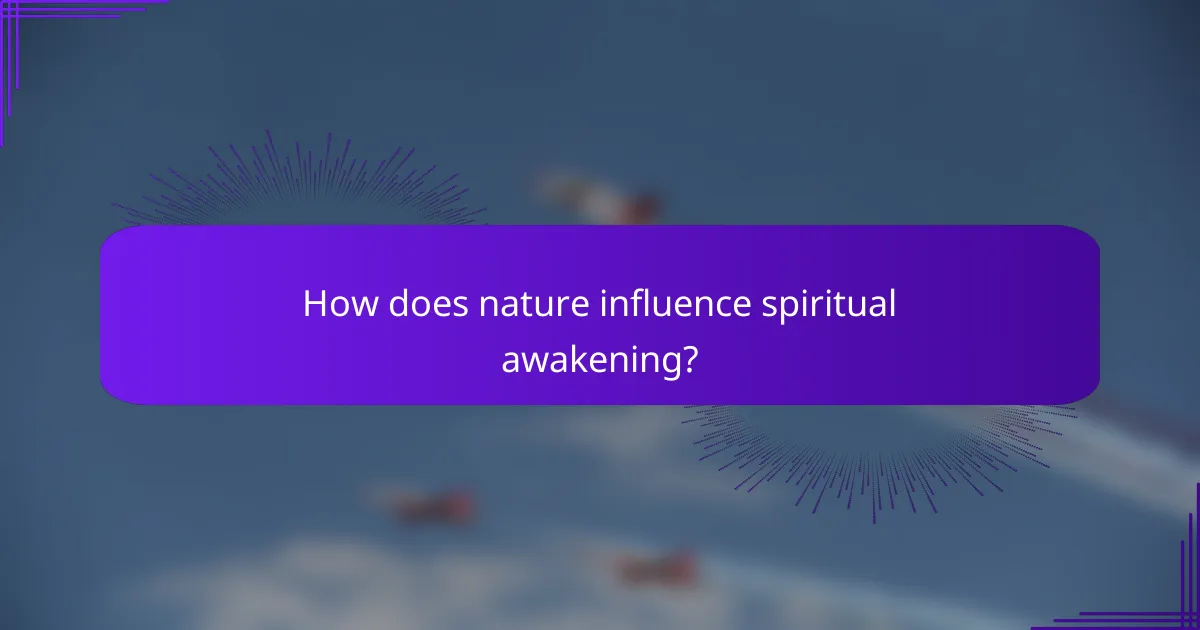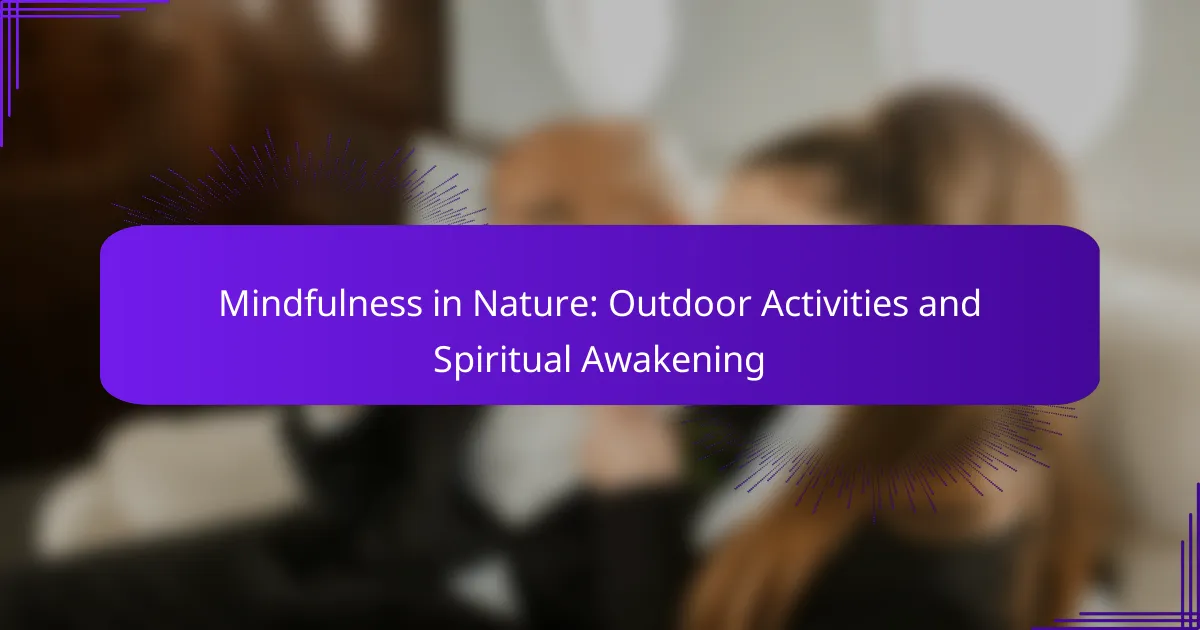Mindfulness in nature offers a unique opportunity to deepen our connection with the environment while enhancing our outdoor experiences. Engaging in activities like forest bathing, mindful photography, and meditation hikes fosters a heightened awareness that can lead to improved mental clarity and emotional well-being. As we immerse ourselves in the natural world, we open the door to spiritual awakening, allowing for self-reflection and a greater understanding of our place in the universe.

How can mindfulness enhance outdoor activities?
Mindfulness can significantly enhance outdoor activities by promoting a deeper connection to the environment and improving overall engagement. By focusing on the present moment, individuals can experience heightened awareness and enjoyment during their time outdoors.
Increased focus and presence
Practicing mindfulness outdoors helps improve focus and presence by encouraging individuals to concentrate on their surroundings. This can involve paying attention to the sounds of nature, the feel of the ground beneath their feet, or the sights of the landscape. Such awareness can lead to a more fulfilling experience, as distractions fade away.
To cultivate this focus, try setting aside specific moments during your outdoor activities to pause and observe your environment. This could be as simple as taking a few deep breaths and noticing the details around you.
Improved emotional well-being
Mindfulness in nature can enhance emotional well-being by fostering a sense of peace and contentment. Engaging fully with the natural world can help reduce feelings of anxiety and depression, leading to a more positive outlook. Studies suggest that spending time outdoors while practicing mindfulness can elevate mood and promote emotional resilience.
To boost emotional health, consider incorporating mindfulness exercises such as gratitude journaling or meditation while in a natural setting. Reflecting on positive experiences can amplify the benefits of your time outdoors.
Connection to nature
Mindfulness practices can deepen your connection to nature by encouraging a sense of belonging and appreciation for the environment. This connection can foster a greater understanding of ecological systems and promote environmental stewardship. Feeling connected to nature can enhance your overall outdoor experience.
To strengthen this bond, engage in activities like nature walks, birdwatching, or simply sitting quietly in a park. Allow yourself to absorb the sights, sounds, and smells of your surroundings, which can deepen your appreciation for the natural world.
Stress reduction techniques
Mindfulness can serve as an effective stress reduction technique when practiced outdoors. Techniques such as deep breathing, progressive muscle relaxation, or guided imagery can be particularly beneficial in a natural setting. These practices help lower cortisol levels, promoting relaxation and mental clarity.
To implement these techniques, find a quiet spot in nature, close your eyes, and focus on your breath. Alternatively, try walking mindfully, paying attention to each step and the sensations in your body as you move through the environment.
Enhanced creativity
Engaging in mindfulness outdoors can lead to enhanced creativity by allowing the mind to wander freely without distractions. Nature often inspires new ideas and perspectives, as the calming environment can help clear mental blocks. This creative boost can be especially valuable for problem-solving and artistic endeavors.
To harness this creativity, spend time in nature without specific goals. Allow your thoughts to flow and take notes on any ideas that arise. Activities like sketching or journaling in a natural setting can further stimulate creative thinking.

What outdoor activities promote mindfulness?
Outdoor activities that promote mindfulness include practices that encourage deep engagement with nature, enhancing awareness and presence. Activities such as forest bathing, guided meditation hikes, yoga retreats, mindful photography, and nature journaling can significantly improve mental clarity and emotional well-being.
Forest bathing in national parks
Forest bathing, or “Shinrin-yoku,” involves immersing oneself in a forest environment to enhance physical and mental health. National parks provide ideal settings for this practice, allowing individuals to connect with nature through all senses. Participants often report reduced stress and increased feelings of tranquility.
To practice forest bathing, find a quiet area in a national park, take slow walks, and focus on the sights, sounds, and smells around you. Aim for sessions lasting at least an hour to fully benefit from the experience.
Guided meditation hikes
Guided meditation hikes combine the benefits of hiking with mindfulness meditation, leading participants through nature while encouraging present-moment awareness. These hikes typically include periods of silence and guided reflections, helping individuals deepen their connection to the environment.
Look for local outdoor centers or wellness retreats that offer guided meditation hikes. Sessions can vary in length, but aim for hikes that last two to three hours to allow ample time for both movement and meditation.
Yoga retreats in nature
Yoga retreats set in natural surroundings provide a unique opportunity to practice yoga while surrounded by the beauty of the outdoors. These retreats often include daily yoga sessions, meditation, and time for personal reflection, fostering a deeper sense of peace and connection to nature.
When choosing a yoga retreat, consider locations that offer diverse natural landscapes, such as mountains, beaches, or forests. Retreats can range from weekend getaways to week-long experiences, so select one that fits your schedule and budget.
Mindful photography excursions
Mindful photography excursions encourage participants to slow down and observe their surroundings through the lens of a camera. This practice promotes mindfulness by requiring focus on details, light, and composition, enhancing the appreciation of nature’s beauty.
To get started, choose a scenic location and set specific intentions for your photography session. Consider taking a photography workshop that emphasizes mindfulness techniques, allowing you to learn while being present in nature.
Nature journaling workshops
Nature journaling workshops combine writing and drawing to foster a deeper connection with the natural world. Participants are guided to observe their surroundings closely, documenting their experiences through sketches and notes, which enhances mindfulness and creativity.
Look for workshops that provide materials and guidance on techniques for effective journaling. Sessions can vary in length, but aim for those that allow for extended time outdoors, ideally two to four hours, to fully immerse yourself in the experience.

How does nature influence spiritual awakening?
Nature plays a significant role in spiritual awakening by providing a serene environment that encourages self-reflection and connection to something greater. The sights, sounds, and sensations of the natural world can lead to profound insights and a deeper understanding of one’s place in the universe.
Natural settings foster introspection
Being in natural settings, such as forests, mountains, or near bodies of water, creates a peaceful atmosphere that promotes introspection. The absence of urban noise and distractions allows individuals to focus inward and contemplate their thoughts and feelings. This quiet reflection can lead to personal insights and clarity about life’s purpose.
To enhance this introspective experience, consider spending time in nature without digital devices. Aim for at least 30 minutes of uninterrupted time to allow your mind to settle and engage deeply with your surroundings.
Connection to the universe
Nature fosters a sense of connection to the universe by reminding individuals of their place within a larger ecosystem. Observing the intricate relationships among plants, animals, and the environment can evoke feelings of unity and belonging. This awareness often leads to a spiritual awakening as individuals recognize their interconnectedness with all living things.
Engaging in activities like stargazing or hiking can deepen this connection. For instance, a night under the stars can inspire awe and reflection on the vastness of the universe, prompting spiritual insights.
Experiencing awe and wonder
Awe and wonder are powerful emotions that can trigger spiritual awakening. Natural phenomena, such as breathtaking landscapes or wildlife encounters, can evoke a sense of amazement that transcends everyday experiences. This feeling often leads to a greater appreciation for life and a desire to explore one’s spirituality.
To cultivate awe, seek out experiences that challenge your perspective, such as visiting national parks or participating in guided nature walks. Aim to immerse yourself in the beauty of nature, allowing yourself to fully experience and appreciate the moment.
Community and shared experiences
Shared experiences in nature can strengthen community bonds and enhance spiritual awakening. Participating in group activities, such as outdoor retreats or volunteer conservation efforts, fosters connections with others who share similar values and interests. These communal experiences can lead to collective insights and a deeper sense of purpose.
Consider joining local nature groups or attending workshops that focus on mindfulness in natural settings. Engaging with others in these environments can amplify the benefits of nature on spiritual growth and create lasting relationships.

What are the prerequisites for mindful outdoor experiences?
Mindful outdoor experiences require an understanding of mindfulness principles, a suitable environment, and clear personal intentions. These elements help individuals connect deeply with nature and enhance their spiritual awakening.
Understanding mindfulness principles
Mindfulness involves being fully present and engaged in the moment, without judgment. Practicing mindfulness outdoors means observing the surroundings, focusing on sensations, and appreciating the natural world. Techniques such as deep breathing and body scanning can enhance this awareness.
To cultivate mindfulness, consider starting with short sessions, gradually increasing the duration as comfort grows. Engaging in activities like mindful walking or nature meditation can deepen the experience and foster a stronger connection to the environment.
Choosing the right environment
Selecting an appropriate outdoor setting is crucial for mindful experiences. Look for locations that resonate with you, such as parks, forests, or beaches, where you can feel safe and at ease. The environment should be relatively quiet, allowing for fewer distractions.
Consider factors like accessibility, weather conditions, and personal preferences when choosing a spot. For example, a serene forest may be ideal for meditation, while a beach could be better for reflective walks. Aim for places that inspire tranquility and connection.
Setting personal intentions
Establishing clear intentions before engaging in outdoor mindfulness is essential. Reflect on what you hope to achieve, whether it’s relaxation, self-discovery, or spiritual growth. Writing down these intentions can help clarify your focus.
As you embark on your mindful outdoor journey, revisit your intentions regularly. This practice can guide your experiences and keep you aligned with your goals. Remember to remain flexible; your intentions may evolve as you connect more deeply with nature.



